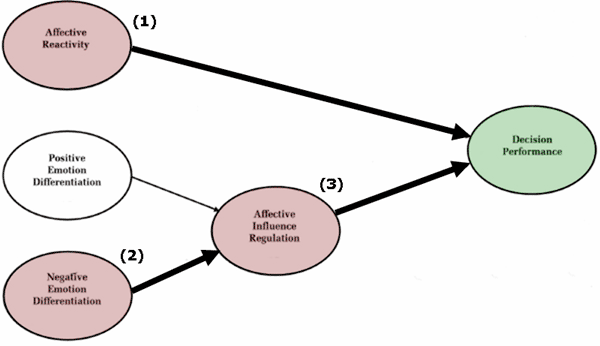Do strong emotions generally help or hinder trading? How do outperforming traders handle their emotions? In the 2007 paper entitled “Being Emotional during Decision making – Good or Bad? An Empirical Investigation”, flagged by reader Dennis Page, Myeong-Gu Seo and Lisa Feldman Barrett investigate the role of emotions in stock trading via a simulation involving 101 traders recruited from investment clubs and paid $100 to $1,000 based on performance during the simulation. Using the self-reported emotional states of these traders during simulated buy-sell decisions on 12 available stocks each day for 20 consecutive trading days, they conclude that:
- Traders who experience more intense emotions while trading tend to outperform.
- Traders who keep their emotions from affecting trading decisions tend to outperform. Experiencing feelings and managing them appear to be independent processes.
- Traders who are better able to identify the intensity of their current negative emotions (irritated, afraid, angry, nervous, frustrated, disappointed, sad, tired and depressed) tend to outperform based on superior ability to control the possible biases induced by these emotions. Those who are less able to identify their specific feelings at the moment of decision underperform due to the influence of emotions they ignore or do not understand.
The following figure, adapted from the paper, summarizes the three critical emotional success factors for simulated stock trading. The study measures trading performance (Decision Performance) based on average daily portfolio return. The three factors significantly contributing to superior performance are:
(1) Strong emotional response (Affective Reactivity), whether pleasant or unpleasant, relates positively to trading performance. In other words, traders who reported strong emotional engagement with trading across the 20 testing days tended to achieve higher returns than those who did not.
(2) The ability to discriminate the degree of anger, nervousness and sadness (Negative Emotion Differentiation) felt while trading relates positively to trading performance. In other words, traders who reported wide swings in these three emotions across the 20 testing days tended to achieve higher returns than those who did not.
(3) The ability to prevent the current emotional state from affecting the level of risk taken (Affective Influence Regulation) relates positively to trading performance. In other words, traders who were least influenced by the strength and net positiveness of their emotions with respect to the risks they took while trading tended to achieve higher returns than those who did not.
Note that Positive Emotion Differentiation, the ability to discriminate the degree of calmness, happiness and excitedness, does not significantly affect trading performance. It is more important for traders to understand their negative feelings than their positive feelings while trading.

In summary, traders should care strongly about their trading, focus on understanding any negative emotions they experience while trading, and work hard to prevent emotions from affecting their risk management practices.